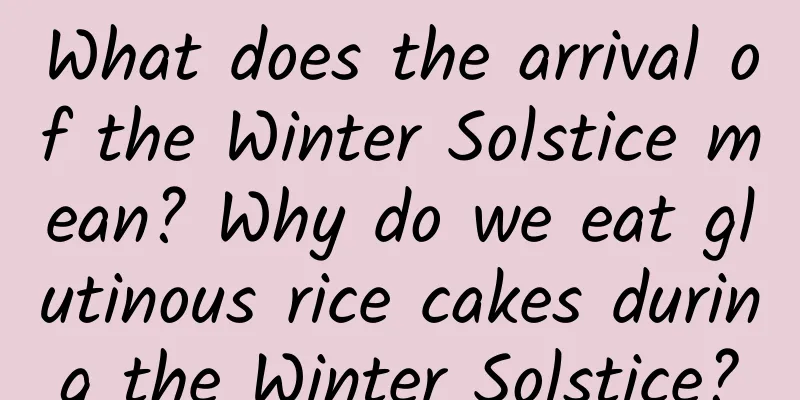What does the arrival of the Winter Solstice mean? Why do we eat glutinous rice cakes during the Winter Solstice?

|
In ancient my country, the Winter Solstice was said to be as important as the New Year. Therefore, on the day of the Winter Solstice, every household would make glutinous rice balls and dumplings during the long night. The arrival of the Winter Solstice means the arrival of winter, where "冬" means winter and "至" means arrival. The Winter Solstice is one of the 24 solar terms and is also the day with the shortest daylight in the year. Why do we eat glutinous rice cakes on the Winter Solstice? Do you know? Contents of this article 1. What does the arrival of the winter solstice mean? 2. Why do we eat glutinous rice cakes during the winter solstice? 3. Customs of the Winter Solstice 1What does the arrival of winter solstice mean?The "dong" in "Winter Solstice" means winter, and "zhi" means arrival and coming. Therefore, the arrival of the Winter Solstice means the coming of winter. After the Winter Solstice, we enter the coldest days of the year and the New Year is approaching, which has a good meaning. In ancient my country, the Winter Solstice was called "Yasui" and "Luchangjie", which reflects the importance of the Winter Solstice. The arrival of the winter solstice means the coming of winter, where "冬" means winter and "至" means arrival. The winter solstice is one of the 24 solar terms and is also the day with the shortest daylight in the year. After the winter solstice, the daylight will gradually get longer, and after the winter solstice, the temperature begins to drop and enters a severe cold stage. In ancient my country, it is said that the Winter Solstice is as important as New Year's Day. Therefore, on the day of the Winter Solstice, each household would make glutinous rice balls and dumplings during the long night, and the family would gather together to strengthen their relationships. In Taiwan, people would also make nine-layer cakes using glutinous rice and other ingredients to worship their ancestors. In ancient times, the winter solstice was also called the Yasui, which means that the New Year will come after the winter solstice, which has a beautiful meaning. The winter solstice is also called the Shoes and Longevity Festival. On this day, the younger generation will give shoes and socks to the elders, hoping that the lifespan of the elders will continue to extend like the day after the winter solstice, and that they will live a long life. 2Why do we eat glutinous rice cakes during the winter solstice?In some places in the south, there is a custom of eating glutinous rice cakes in the tenth month of the lunar calendar. In ancient times, glutinous rice cakes were traditional festival offerings in the south, and were originally used by farmers to offer sacrifices to the cow god. There is a saying "In the tenth month, glutinous rice cakes are burned", which refers to the sacrificial event. Legend has it that in the past, when the hardworking cows saw people happily eating glutinous rice cakes, they shed tears silently. When people saw the cows crying, they hurriedly gave the glutinous rice cakes in their hands to the cows, made two big glutinous rice cakes, hung them on the cows' horns, and led the cows to the waterside to look in the mirror. When the cows saw the glutinous rice cakes on their horns, they smiled happily. In order to express people's gratitude to the cows for their hard work, people would give some glutinous rice cakes to the cows every year. Later, people designated the beginning of the tenth month of the lunar calendar as the "Cow King Festival", and the custom of making glutinous rice cakes to honor cows has been passed down. 3Winter Solstice Customs1. Sacrifice The Winter Solstice Festival is also known as the Winter Festival or the Winter Crossing Festival. It is one of the 24 solar terms and a traditional festival in China. There was a saying that "the Winter Solstice is as important as the New Year". The court and the people have always attached great importance to it, and there have been sacrificial activities since the Zhou Dynasty. 2. Eat dumplings Every year on the winter solstice of the lunar calendar, dumplings are an indispensable festival meal for everyone, regardless of their wealth. As the saying goes, "On October 1, the winter solstice arrives, every household eats dumplings." This custom is in memory of the "medical saint" Zhang Zhongjing who gave away medicine on the winter solstice. Eating dumplings on the winter solstice is a way to remember the kindness of the "medical saint" Zhang Zhongjing's "Quhan Jiao'er Soup". To this day, there is still a folk song in Nanyang that goes "If you don't eat dumplings on the winter solstice, your ears will freeze off and no one will care." 3. Jiujiu to get rid of the cold After the beginning of the ninth day of the ninth lunar month, some literati and scholar-officials would organize so-called cold-eliminating activities. They would choose a ninth day and get together with nine people to drink ("wine" and "nine" are homophones of each other), with nine dishes and nine bowls on the table. A "nine-piece" mat would be used to carry out the so-called cold-eliminating activities. Song of the Nine-Nine Days to Get Rid of the Cold: Don’t go out on the first and second nine days; walk on the ice on the third and fourth nine days; from the fifth to the sixth nine days, watch the willows along the river; on the seventh nine days, the river ice melts and on the eighth nine days, swallows come; on the ninth nine days plus the tenth nine days, oxen can be seen everywhere. 4. Tomb sweeping During the winter solstice, tomb sweeping is usually done by brothers and cousins who gather together to go to the mountain to visit the ancestral tombs of shallow generations. Each person brings his own offerings, and whoever has something in his family brings what he has. At that time, people would bring "three animals" when sweeping tombs, including rice, fruit, and homemade sweets. Clams must be brought, because there is a custom that after sweeping the tomb, you must eat clams in front of the tomb, and then sprinkle the clam shells on the tomb. Once the tomb is swept, the people who participate in the tomb sweeping will gather in front of the tomb to eat. There are all kinds of things in front of the tomb, and you can eat whatever you want, and you can eat anything from anyone's family. It is known as a good attitude, and it is more suitable for visiting the sick. |
Recommend
What is the reason for pink menstruation? How to regulate it
Generally speaking, the color of menstrual blood ...
Lumbar pain when menstruation is coming
Menstruation is a normal physiological manifestat...
Match: 2017 American Singles Dating Report
"Singles are redefining courtship in healthy...
Will the ovulation test paper always show positive results after pregnancy?
Nowadays, in order to achieve the goal of eugenic...
What should pregnant women do if their throats get inflamed?
Colds and sore throats are symptoms that people a...
Can girls drink milk tea when they have their period?
There are many foods that girls should not eat wh...
Can adults drink breast milk?
Breast milk is a very good food for newborn babie...
What are the methods to delay ovarian aging?
There is a saying that goes, if you want your hus...
Causes of Candida infection in women
Many bacteria in nature can cause certain harm to...
Youth is not discounted, and young people must also learn to stay away from osteoarthritis!
Author: Cao Jiangang, Chief Physician of Tianjin ...
What to do if the endometrium is too thin and menstruation does not come
If a woman's endometrium is too thin and she ...
Can eating a papaya every day really help enlarge your breasts?
Papaya as a fruit has very high nutritional value...
Inner thigh pain during late pregnancy
Pregnancy is a big event for every woman. Everyon...
What physical examinations should women take every year
That is, bimanual examination inside the vagina, ...









